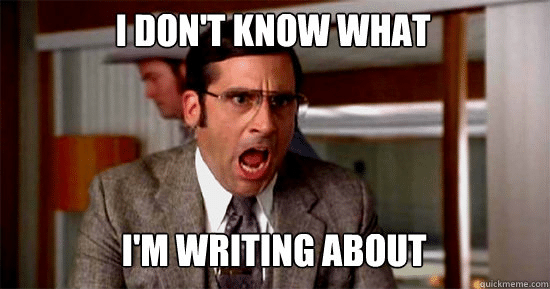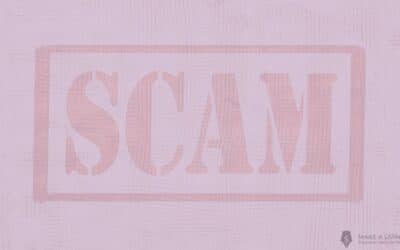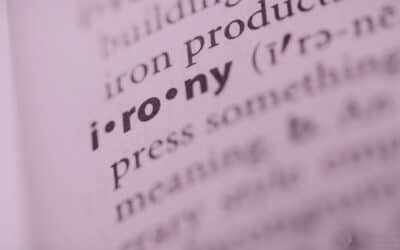Knowing how when to write with humor is an important skill every writer should know.
Humor is not always appropriate, and when used improperly it can alienate readers or annoy an audience.
That said, humor isn’t used enough in writing and can add a lot of surprise and delight on the page when used correctly.
What Is Humor?
According to the dictionary, humor is:
The mental faculty of discovering, expressing, or appreciating the ludicrous or absurdly incongruous : the ability to be funny or to be amused by things that are funny…. HUMOR implies an ability to perceive the ludicrous, the comical, and the absurd in human life and to express these usually without bitterness.
Merriam-Webster Dictionary
There are also different types of humor such as:
- Hyperbole
- Pun
- Irony
- Incongruity
- Slapstick
- Surprise
- Sarcasm
- Satire
- Self-deprecation
- Overstatements
- Dark humour
You may be able to utilize multiple forms of humor, depending on the type of writing you are planning to do.

Why You Should Use Humor In Your Writing
Most of us can agree that adding humor to our writing can be difficult to execute well.
Your jokes might not land, your quip may not translate properly (or there will be a cultural clash), readers may not be able to interpret the tone you intended, or you’re not that funny.
However, when it goes well, humor can enhance writing and make it stronger than you could dream. Think about it, have you ever burst out laughing after reading hilarious writing? When you have an enjoyable outburst like that, it makes you appreciate the writing even more.
That moment where you see something that you’ve always thought, but somebody has articulated it. And they’ve articulated it in a way that you’ve never seen before.… It’s the joy of the unexpected. Whether it’s broad or whether it’s subtle, is always vital.
Neil Gaiman
When to Write with Humor
Knowing when to write with humor can help you stand out as a writer. Here are five questions to ask yourself to help you determine whether or not humor is the right choice.
1. Will Humor Make My Writing Stronger?
One of the things you will want to ask yourself before you add humor into your writing is if it will make that particular piece or scene stronger.
If humor and personality will strengthen it, then look for ways to integrate it into your piece. This can be through creating a relatable situation with the reader, using self-deprecation, surprise, or something else to bring about the good feelings associated with hilarious writing.
2. Will Humor Deepen the Connection With My Reader?
This will be a subjective decision, but sometimes you can use humor like an inside joke, which serves to deepen your relationships with your readers. Think about the people you love talking with and how laughing together creates a unique bond.
If you can make your readers laugh, they will love your writing.
3. Is it Key to Your Voice as a Writer?
Most people prefer one style of humor over another. And some writers use this style as part of their brand.
For example, some writers only use dark humour in their writing or are known for it. This can be a reason that readers choose to follow you and connect with your work.
4. Do You Love Reading Writing with Humor?
What makes you laugh? Keep track of the type of humor you prefer study what makes it work.
There’s a lot to learn from pieces that incorporate the style of humor you appreciate, so take time analyzing why you enjoy the humor of certain authors, what they say, and how they say it.
Next, think about how you can use those styles in your writing.
5. Do You Need Humor in Your Dialogue?
If you are writing a book with dialogue, adding humor may be a crucial step. You will want to take the time to practice it so you can do it well and it works for your characters.
You might choose to have a funny character, or a narrator with a humorous tone, or want to tell a story with satire. It can be a good way to spice up how readers feel about a character or a situation.
When to Avoid Using Humor in Your Writing
If you’re deciding when to write with humor, think about the intention behind your piece.
For example, if it’s a type of writing where humor may be taken out of context or could hurt you or be seen as off-putting, you may want to avoid humor.
It depends on the client and publication, but this could go for email marketing, B2B writing, journalism, academic writing, or anything else where the content should be more serious.
If you are unsure if you should use humor or not, ask yourself if there could be consequences if someone didn’t get the joke or took offense at what you wrote.
For example, if a joke that doesn’t land could get you fired, is it worth it? However, if you are writing for an edgy blog and you know the site owners are open to it, then it may be fine. If you have doubts, check with your editor.
How to Avoid Problems When Using Humor
There are a few things you will need to keep in mind when it comes to avoiding any potential problems when incorporating humor into your writing.
One of the first things you will want to think about is that you will want to know your audience as well as you can. That way, you can properly choose the types of humor to use and talk about things they will find humorous.
On top of that, you will want to make sure you practice writing with humor before you use it in a situation where you are not sure how well it will go.
You may even want to consider getting someone else to read your work before you use it, to make sure it works as you’ve intended.
Examples of Humor In Writing
Here are a few books that utilize humor to help you determine when to write with humor:
- Bossypants by Tina Fey
- Hyperbole and a Half: Unfortunate Situations, Flawed Coping Mechanisms, Mayhem, and Other Things That Happened by Allie Brosh
- Born A Crime by Trevor Noah
- I Feel Bad About My Neck by Nora Ephron
- Let’s Pretend This Never Happened by Jenny Lawson
Before You Go
Looking to make it as a freelance writer? Wondering what it takes to go full-time and spend your days writing about fascinating things?
The Writer’s Den is exactly what you need to succeed as a freelance writer. It is a group that can help you cut through the noise and figure out what actually matters on your path to success.










